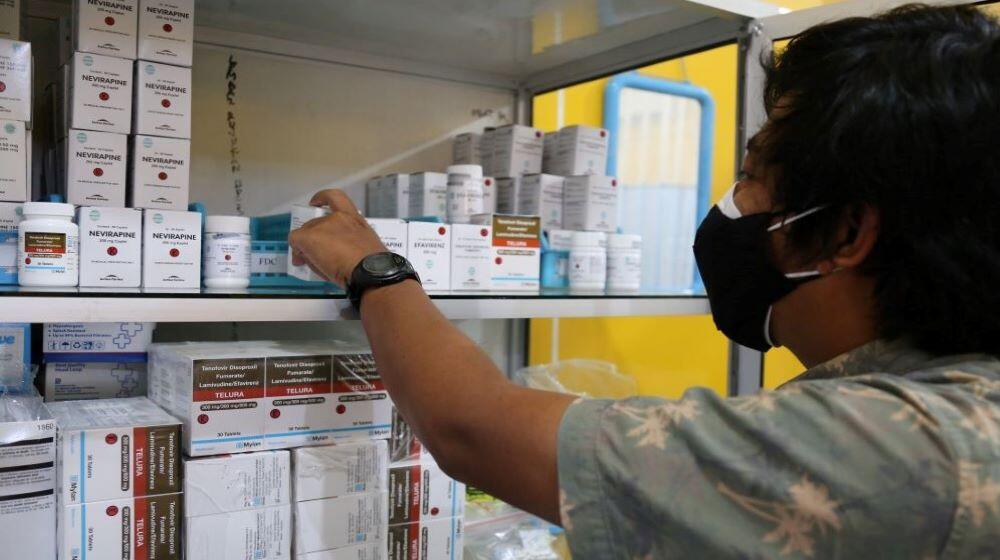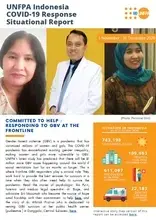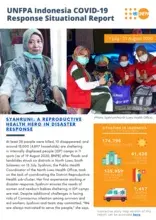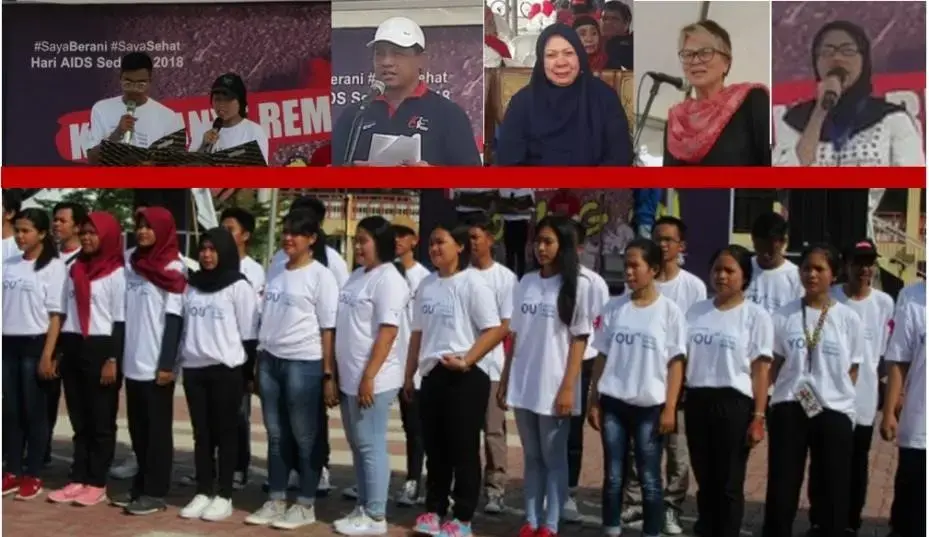Wati*, 38, did not know she had HIV until she had to take a test after her husband got hospitalized and tested positive for HIV. “When I first learned that I had HIV, I felt like my world was falling apart. I really didn’t expect to get infected,” Wati recalled. “What’s worse was that my husband was really sick… He couldn’t work and we could not use BPJS (the national health insurance, ed.) to pay for the hospital,” she continued.
Wati and her then four-year-old child also went through voluntary counseling and testing (VCT). “Initially my child had to take the test once a month, and then once every three months, once every six months, and once a year. After she continuously tested negative for a year, the testing stopped,” she explained.
Women are vulnerable to HIV infection from their partners. In Indonesia, around 200,000 women aged 15 and over live with HIV, which account for about 38% of 520,000 adults aged 15 and over living with HIV. With additional burdens of misinformation, stigmatization, and discrimination, women are often rendered unable to access healthcare services, and thus are at risk of not getting proper treatment. As part of the Leaving No One Behind programme funded by the Government of Japan, UNFPA Indonesia initiated cash voucher assistance (CVA) in 73 cities and districts that seeks to help people living with HIV access life-saving HIV treatment during the COVID-19 pandemic.
Women living with HIV face layers of vulnerabilities
Sari*, 36, also became infected with HIV from her late husband. “He was really sick… At that time we had been separated… His family did not tell me what he was sick of,” she recalled. “He probably didn’t want to take the antiretroviral (ARV), or wasn’t aware that he needed the treatment. His family didn’t understand what’s going on, so they put him in a separate home.”
Sari finally took an HIV test after a relative told her that her former husband died of HIV. She did not get ARV treatment right away after knowing her status, however. “I was scared. And then I tried herbal medicines from a relative. But it didn’t work.” So, four months after knowing her HIV status, Sari finally started her ARV treatment.
After HIV infection, women often face misinformation, stigmatization, and discrimination that make them more vulnerable.
When Wati was about to deliver her baby, a major hospital refused to take her because they did not have the equipment. “I didn’t know what equipment they were talking about. I had to go to another hospital,” she said with tears in her eyes.
On top of it, Wati also has had to face double economic burdens due to HIV. After her husband got sick from HIV infection, she has had to work as a tailor to support her family, and pay off their medical debts. “My husband couldn’t work for a while, so I had to work hard by myself. We had to take out loans to pay for our debts. Thankfully we have paid them off now. There was a time where we didn’t have anything to eat,” Wati said.
Not long after her husband and her tested positive, Wulan*, 38, lost her husband due to long untreated HIV. Ever since, Wulan has had to work three shifts a day to make ends meet. Her two children depend on her. But after she got into an accident at work in early 2021, where one of her legs was hit by a forklift, she had to leave her two shifts a day job cooking at a canteen.
“I had to work three times a day until I got into a work accident… I used to work at a factory in the morning, and then at a canteen where I worked two shifts, afternoon and evening,” Wulan reminisced. “I have left the canteen job, so now I only work at the factory,” she continued. At the factory, she is paid Rp 85,000 a day. She works 8 hours a day and only takes a day off on Sunday every week. At the canteen, she was paid Rp 40,000 for a three-hour shift. She is planning to go back to the canteen job after her leg recovers. “The money I make from the factory is not enough,” she said.
These multiple burdens may impact the mental health of women living with HIV. They are also at risk of gender-based violence (GBV). UNFPA Indonesia’s CVA initiative allows them to access counseling as well as referrals for sexual and reproducitve health and GBV services as part of a comprehensive intervention package.
Role of peer support group
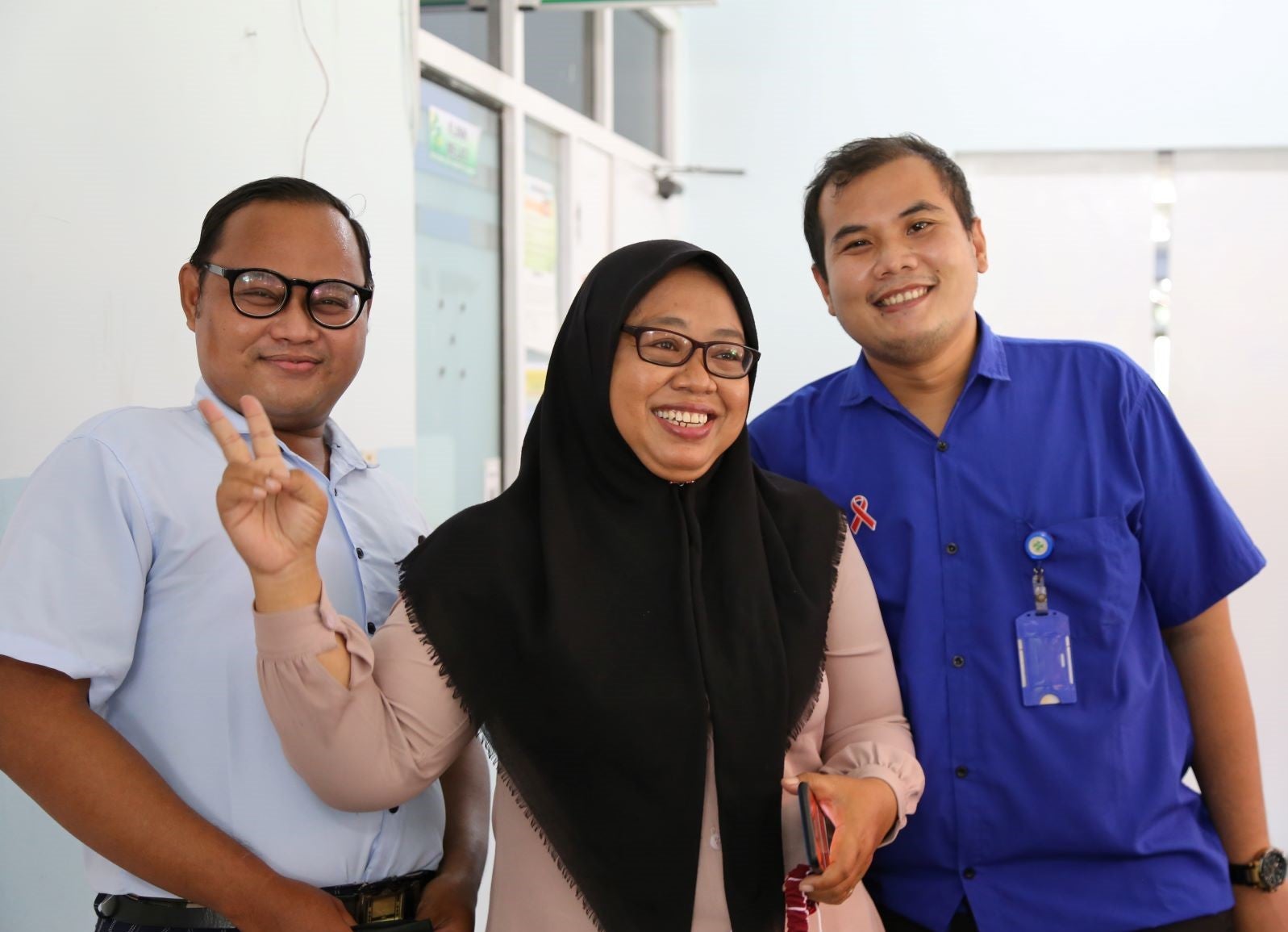
Dedi, Nur, and Rizki are passionate about their role as peer supporters.
Wati, Sari, and Wulan find consolation from a peer support group.
Having joined a peer support group for the past three years, Wati has learned about the hardship that her peers have gone through. “ A lot of my friends in the peer support group also have the same experience as me… A friend even died because they stopped their ARV treatment and didn’t get enough information. They also struggled with their HIV status,” Wati recalled. “I also felt down when I first knew I had HIV. I cried everyday… Thankfully I found support from the group,” Wati said.
“I have no choice but to accept the fact. Thankfully there are peer supporters who help. After feeling down for some time, I feel better now,” Wulan said. Wulan met her peer support at the hospital she was referred to by the community health center (puskesmas) where she tested for HIV.
“Sometimes the people we support are very closed off even though we try our best to help. Sometimes they don’t believe that they have to take the ARV treatment regularly for the rest of their life. They cannot accept the fact that they are ‘sick like that’,’” Dedi, a peer supporter at a hospital in Gresik, said. “Sometimes they take alternative treatment like herbal medicines and then their condition drops,” he continued. Nur, who also works as a peer supporter at the Gresik hospital, has the same experience. “Some of them would misunderstand us. When we encourage them to do the treatment routinely, they feel like we force them,” Nur said.
Despite the challenges they face, both Dedi and Nur are determined to support their peers. “We have been there… When we first learned of our HIV status we felt really down and needed friends. Many of them also don’t talk to their family, so they really need support,” Dedi shared his motivation as a peer supporter. “When I tested positive for HIV in 2010 I didn’t have any support at all. I was forced to leave the village I was living in three times because of my HIV status. Only after I met people from the Mahameru Foundation did I get support,” Nur recalled.
Budi, a peer supporter at a hospital in Mojokerto, had a similar experience as Nur. “I have experienced being rejected and judged by the village chief because of my HIV status,” Budi recalled. “I finally decided to work in the community to eliminate the stigma,” he continued.
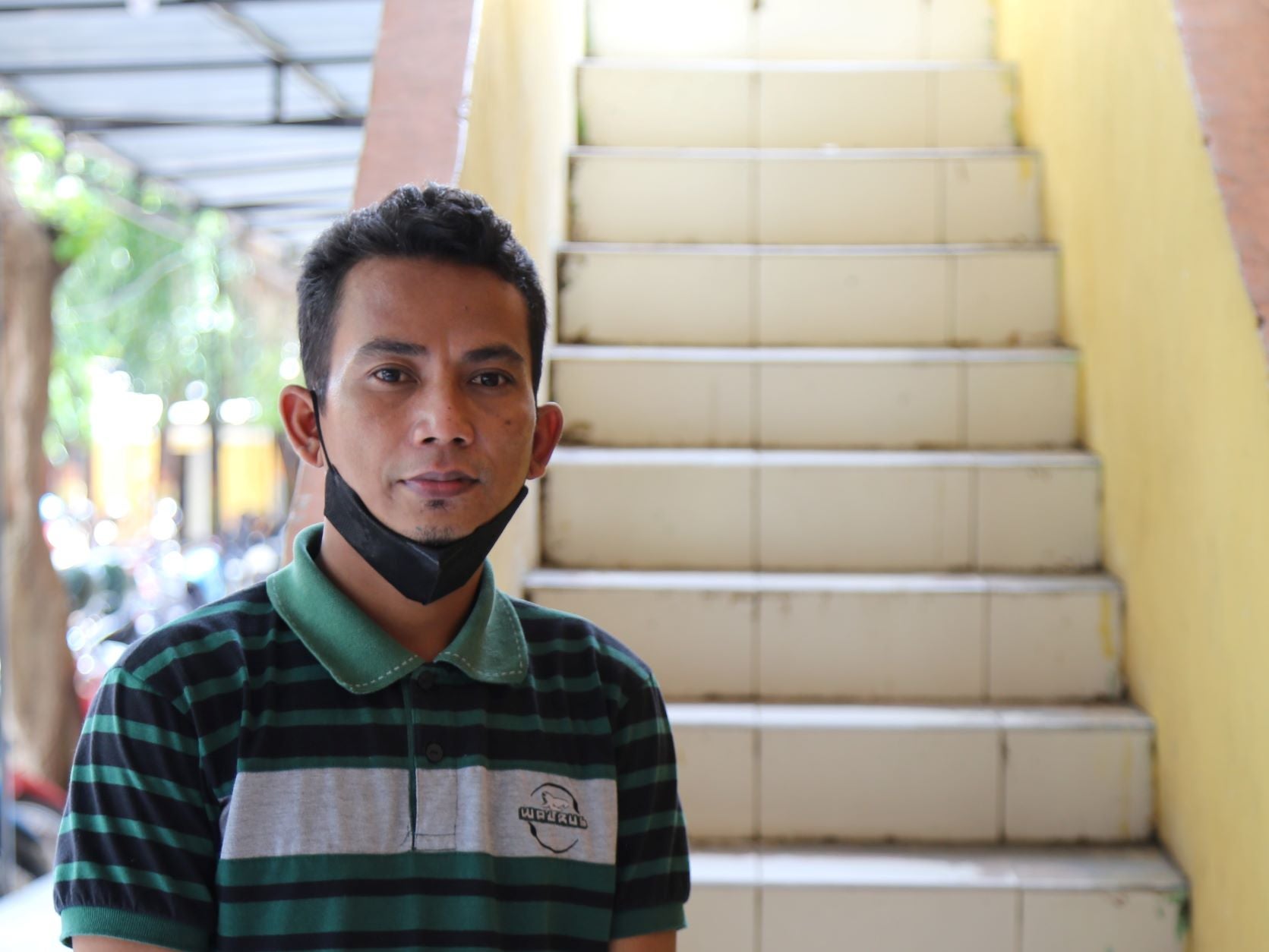
Learning from his experience Budi is determined to eliminate stigma against people living with HIV.
Rizki, a peer supporter who works with Dedi and Nur, wants to motivate people living with HIV to be more optimistic. “Most people think that your life will be cut short because of HIV. But we share the information that we can lead a long and healthy life,” Rizki said. “We convince them that this virus is not a killer. I think what kills people is not HIV but opportunistic infections and mental health,” Nur added.
With the CVA initiative, UNFPA Indonesia empowers communities, and builds effective peer support mechanisms. It was from the peer supporters that Wulan heard of the CVA that UNFPA provides in collaboration with Mahameru Foundation in East Java. “The mechanism is pretty easy… I had to fill out a form and sign it… A month after registration I received the first cash disbursement,” she said.
Every selected recipient gets up to eight cash disbursements worth Rp 150,000 each, depending on their needs. “The amount is pretty good. Now I have more money for transportation to pick up the medicine. The rest I can use for other needs like my children’s pocket money, so I am thankful,” Wulan said.
“I get ARV treatment from the hospital,” Wulan said. She has visited the hospital in Gresik, East Java, every month to pick up her ARV. It takes her a 45-minute motorcycle ride from home to the hospital. After the work accident, her neighbor and child have helped her pick up the ARV. “There was a period where I would get the ARV late, however. Now thankfully I consume the ARV regularly. I am happy because the virus is undetected now,” she said.
A peer supporter also informed Sari of the cash assistance that she could receive. “It’s really helpful. I have used the money for the transportation to go to the hospital. And then I used the rest for household expenses like groceries,” Sari explained. Wati has also found the CVA to be helpful. “It helps with our household expenses. I hope that this assistance can be expanded so more people can get it,” Wati said.
Hope for the future
Wulan is also one of the few lucky ones whose family knows of their HIV status and provides the support they need. Wulan plans to remarry, although she is not sure of her prospect. “I am scared that I cannot find someone who can accept me, with my condition and two children,” Wulan said.
Sari, on the other hand, has found someone who loves and accepts her. “I was scared about telling him my situation at that time… But then he told me that there’s no need to be afraid of another human being. He said he accepts me for me,” Sari reminisced. With her current husband, she has a three-year-old daughter.
Having worked with people living with HIV in the health system, Dedi, Nur, and Rizki highlighted the worrying stigmatization against HIV at healthcare facilities. “We need to educate more people that HIV is not like what people think, so that we can eliminate the stigma,” Nur said. “Stigmatization still occurs at puskesmas. That’s why many of our peers are reluctant to go there,” Rizki explained.
Another prevalent issue among people living with HIV is ARV treatment dropout due to either stigmatization, lack of information, or economic barriers.
There are many single mothers and older persons who rely on their neighbors because they cannot work. “Around 50 percent of patients here have dropped out of their treatment,” Nur said. “We would usually collect donations to help people access ARV treatment,” she continued.
Budi said peer supporters in his area would help the patients with money from their own pocket. “We do it pretty frequently, at least once every one or two months,” he explained. “The cash voucher assistance is really helpful for my peers. My peers who are less fortunate are really happy to get the assistance. It has thankfully eased their financial burden,” Budi said.
To address this issue, Budi said costs of healthcare services need to be reduced, provision of vitamins and supplements need to be improved, and more doctors need to be available at puskesmas.
Nur also has another suggestion. “I want to see people living with HIV empowered. Maybe they can be supported to start their own business,“ Nur said firmly.
The cash voucher assistance is a significant first step to remove the barriers that people living with HIV face and make services more equitable so that no one is left behind.
*Not her real name
Dian Agustino
Communications Analyst, UNFPA Indonesia

